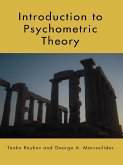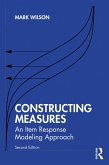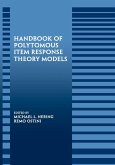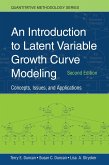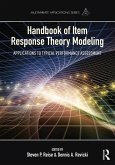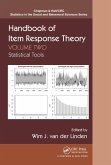Dieser Download kann aus rechtlichen Gründen nur mit Rechnungsadresse in A, B, BG, CY, CZ, D, DK, EW, E, FIN, F, GR, HR, H, IRL, I, LT, L, LR, M, NL, PL, P, R, S, SLO, SK ausgeliefert werden.
"Introduction focuses on measurement of unobserved constructs and builds on latent variable modeling to produce a refreshingly new and integrative presentation of psychometric theory. Indeed, the latent variable approach serves well to integrate classical test theory, generalizability theory, and item response theory. It is a must read (if textbooks can be so described!) for scholars as well as students of psychometric theory and practice." - Richard J. Shavelson, Stanford University, USA
"The market is ... begging for this book...The existing texts are either too dated [or] too inaccessible ... The authors .... capture critical intellectual developments of the last decade ... they effectively exploit computational advances to put all of this in an applied context, thereby grounding the material in real world examples. The quality of the scholarship ... is simply first-rate.... The coverage is right on...The writing is superb and accessible..... The ability to work through each example using the authors' datasets is invaluable ...I would ... adopt this text and use it to reinvigorate my own course. It promises to provide a great opportunity to refresh the way we teach this material." - Scott L. Thomas, Claremont Graduate University, USA
"This text will make a unique and important contribution to the field. It is extremely well-written. ... An excellent text for a ... course in psychometric theory. ... The references are current, reflecting the most recent work in classical test theory. The software applications ... are a unique and powerful asset." - Jennifer Rose, Wesleyan University, USA
"I ... congratulate the authors on tackling the complex area of psychometric theory ... so well and putting so much effort into making ... their book ... accessible to a wide audience. ... I ... would certainly adopt this book ... [for] a graduate-level course ... in educational and psychological measurement. ... One of the strengths ... is the provision of code in the text as well as ... data files and codes on the website. ... What makes the book most unique is the unified treatment of multiple latent-variable methods." - André A. Rupp, University of Maryland, USA
" It was very easy to read ... anyone would be able to read this and understand [it]... the examples were very useful. ... Most [competing] books have not been revised or can be challenging... the strength of this book is its breadth." - Robert Henson, The University of North Carolina at Greensboro, USA



